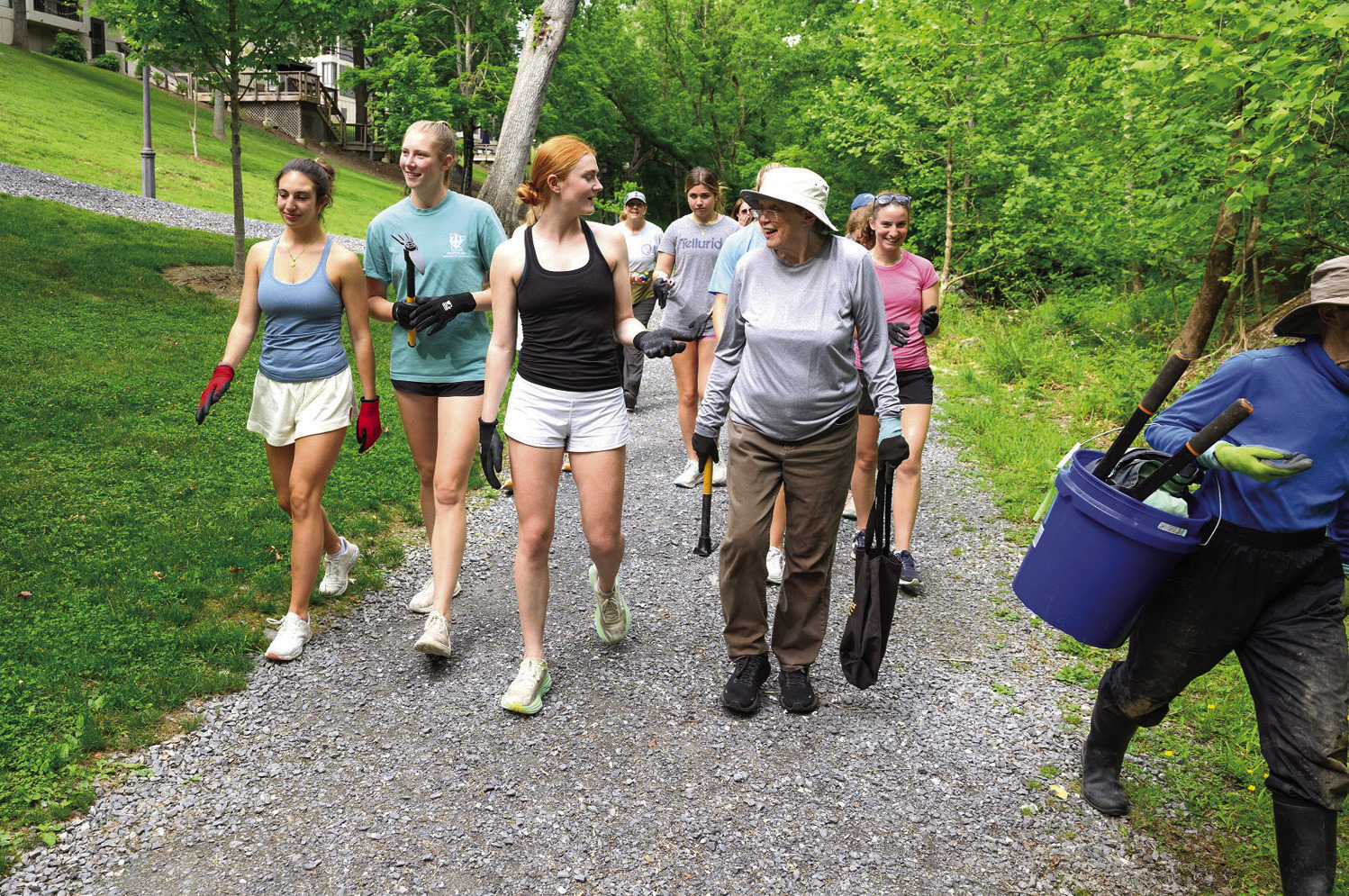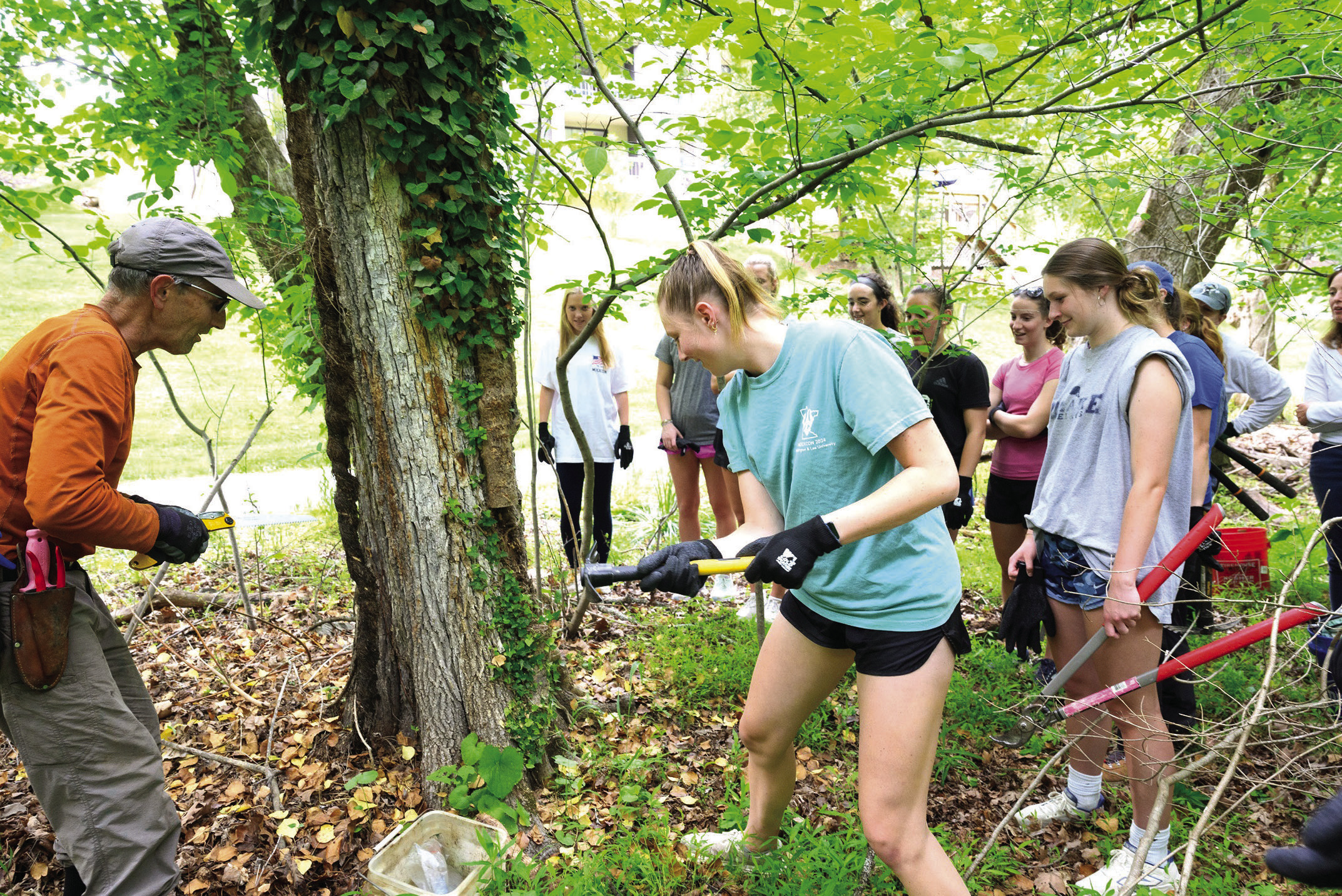W&L Soccer Team Helps Tackle Invasive Species On Trail
Editor’s note: The following story was written by Laura Lemon, assistant university editor at W&L.
The buzzing of saws, the ripping of roots and the trademark exchanges of teamwork filled the forest glen running alongside Woods Creek, behind its namesake apartment buildings, on the afternoon of May 16. With the help of Jane Stewart, Washington and Lee University’s director of sustainability, the women’s soccer team partnered with members of the Friends of Woods Creek and the Rockbridge Area Master Gardeners to remove invasive species disrupting the well-being of the creek and surrounding woodlands.
The invasive species in focus: English ivy and bush honeysuckle. With saws, pliers and heavy-duty garden hoes, the women’s soccer team worked to pull the ivy roots off the native trees; the roots were so thick they had embedded themselves into the trees’ trunks.
“This was not, ‘Wear your soft little gloves and pull things out of the ground,’” said Stewart. “This was, ‘Take a saw; saw this giant ivy trunk here; saw here; hack away.’ It was really hard work. The women from the soccer team – they’re athletes – are really strong, and they were able to do a ton of work in a very short period of time.”
For the team, this physical work counted as an activity under the Generals Earth Action Leadership program, where student-athletes volunteer for environmental stewardship opportunities. But the project was also part of a larger effort extending to the Lexington and Rockbridge County communities.
In 2017, the Virginia Department of Environmental Quality designated Woods Creek as an impaired stream for E. coli and sediment, signaling the poor condition of the creek and the need to address its problems.
The Lexington Planning Commission established the Healthy Green Neighborhood initiative in recent years with the goal of connecting various Lexington organizations — such as the city of Lexington, W&L, Virginia Military Institute, Rockbridge Conservation and its subset, Friends of Woods Creek and Boxerwood Nature Center & Woodland Garden — to projects, such as improving Woods Creek, that would better the environmental and human health of the community. Stewart serves as a representative for W&L on the Health Green Neighborhood initiative.
“[Woods Creek] runs through property that’s owned by the city, W&L and VMI, and it is a flowing body of water,” Stewart said. “If the city is doing one thing, and we’re doing another, and VMI is doing another, you can’t manage that. There has to be coherent strategy among everybody who cares about it. And then, we also have this incredibly engaged community of people who love the creek and use the trail all the time and have very strong feelings about protecting these resources. The work on the creek is just one example of the kinds of projects that this group will hope to support and facilitate.”
Eradicating invasive species is one of the ways of tackling the problem of erosion and water quality at Woods Creek. Their removal allows space for native plants to grow, which diversify the ecosystem and prevent the ruin of creek banks.
“Invasives are spread by birds and underground rooting over large areas,” said Sandra Stuart, co-chair of the Rockbridge Conservation’s Watershed Committee and head of the Friends of Woods Creek. “They tend to bloom early before the native plants and take over the soil nourishment. They are shallow- rooted, do not filter out the detrimental elements and do not slow down rainwater going into the stream, causing erosion and sediment damage of the streambanks.”
When looking for an earth action opportunity, the women’s soccer team wanted a project that helped the university community and beyond.
“We chose this event because we wanted to actively make a close impact on the W&L community,” said Sarah Lathrop ’25. “As a large team, we wanted to help with something that will benefit the general W&L and Lexington environment. Volunteering on the Woods Creek Trail was the perfect opportunity to bring our team together to make a positive impact on our surrounding environment.”
“ We t horoughly e njoyed learning more about the environment that surrounds us,” said Ann Riley Huber ’25. “Being college students, it’s hard to take time to appreciate the world around you. Serving our community and our environment through the Woods Creek volunteer cleanup allowed us to take a step back and truly soak in our beautiful surroundings.”
According to Stewart, having students play an active role with the Healthy Green Neighborhood initiative allowed them to see themselves as part of the Lexington community — not just passersby — and allowed for all individuals to break down the barriers that can separate college students from Lexington residents.
“It was wonderful to see the members of the soccer team working with the master gardeners and Friends of Woods Creek volunteers, doing good work and having fun doing it,” she added. “It’s a great reminder that although we may be part of one student group, one volunteer organization or one institution, we are also all part of one community.”
‘We thoroughly enjoyed learning more about the environment that surrounds us. Being college students, it’s hard to take time to appreciate the world around you. Serving our community and our environment through the Woods Creek volunteer cleanup allowed us to take a step back and truly soak in our beautiful surroundings.’ - Ann Riley Huber

THE WOMEN’S soccer team walks the Woods Creek Trail with Sandra Stuart of the Friends of Woods Creek and Jane Smith (right) of Rockbridge Area Master Gardeners.

THE W&L WOMEN’S soccer team works with David Rosher of the Friends of Woods Creek to learn how to remove English ivy. (all photos courtesy of W&L)
.jpg)


